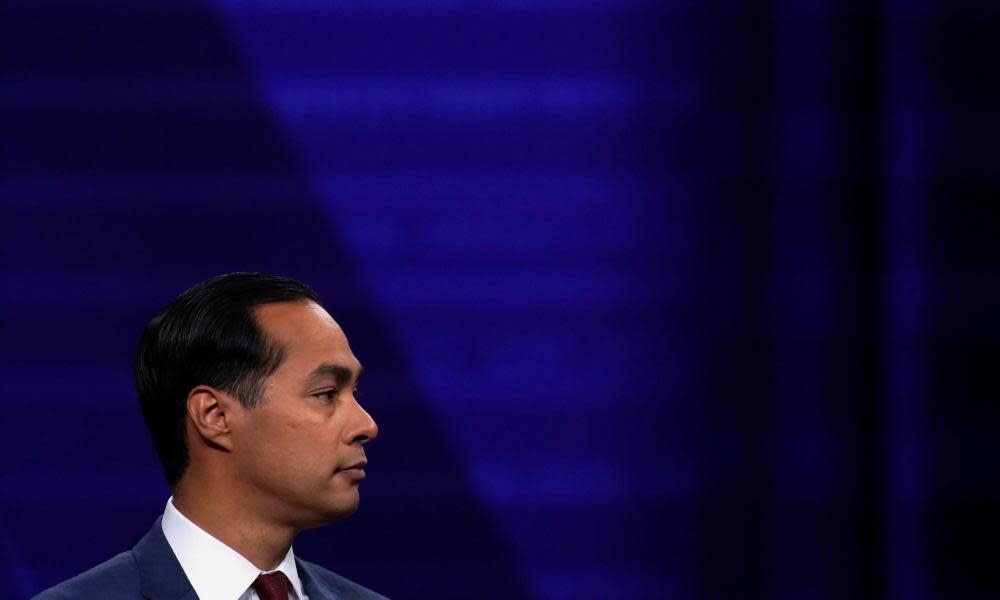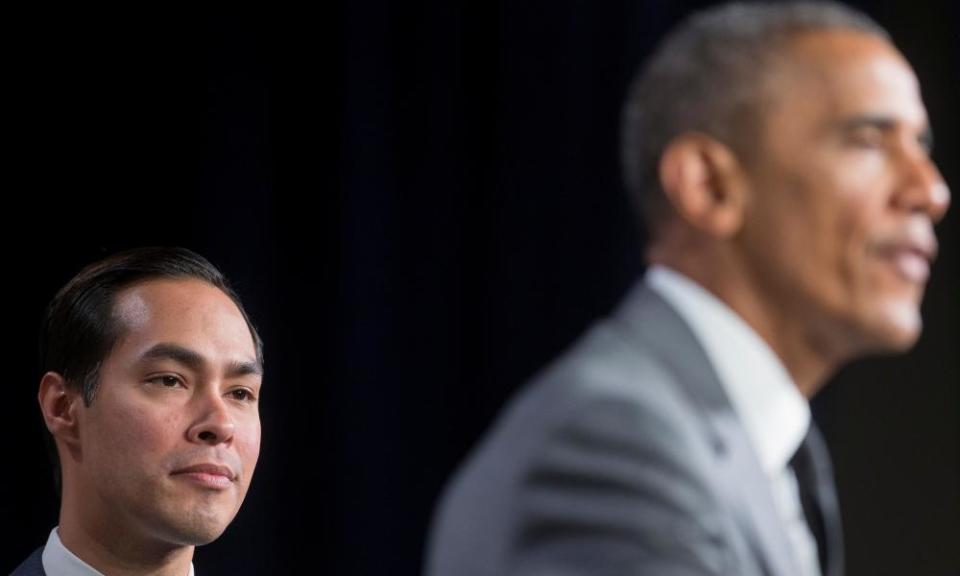Julián Castro: progressive champion's exit thins Democratic field's diversity

The buzz around Julián Castro began at 10.27pm on 4 September 2012, when the then 37-year-old mayor of San Antonio finished delivering the keynote address at the 2012 Democratic national convention for Barack Obama’s re-election.
Almost immediately, his rousing speech, delivered in a primetime slot from the Time Warner Cable Arena in Charlotte, catapulted him on to the national political stage as a similarly vaunted convention address had done for Obama in 2004. The echoes were lost on no one, and the swirl of speculation began that the young mayor was a potential heir to Obama’s multiracial coalition of voters that twice lifted him to the presidency.
Castro, the grandson of a Mexican immigrant who was raised by a single mother and educated in San Antonio’s public schools before attending Stanford and Harvard and eventually serving as housing secretary in the Obama administration, announced he would run for president less than a decade later. He cast himself as a progressive champion with an “only-in-America” story, waving off questions about his profile and experience against a field of diverse and better-known rivals.
“Look around,” he told the crowd at his launch rally last year in San Antonio. “There are no frontrunners born here, but I’ve always believed that with big dreams and hard work, anything is possible.”
But on Thursday – almost exactly a year later, and a month before the Iowa caucuses, Castro ended his campaign for the Democratic nomination.
“I’ve determined that it simply isn’t our time,” Castro said in a video to supporters on Thursday. “Today it’s with a heavy heart, and profound gratitude, that I will suspend my campaign for president.”
Democrats keep falling into the trap of comparing every minority candidate to Barack Obama
Michael Starr Hopkins
His exit extinguished – at least for another four years – the hope of electing the country’s first Latino president and marked the latest departure by a person of color in a field that began as the most diverse in US political history.
Democratic strategists and activists say Castro’s failure to launch is a reflection of the changed political landscape since he first rose to prominence – and the barriers that still exist for candidates of color – and not of Castro’s skill or potential.
“Democrats keep falling into the trap of comparing every minority candidate to Barack Obama,” Michael Starr Hopkins, a Democratic strategist who previously worked for John Delaney’s 2020 presidential campaign. “Barack Obama was a once in an every two or three generations kind of candidate and comparisons to him only put them at a disadvantage.”
In 2014, Castro became Obama’s housing secretary. Two years later, he was was floated as a possible running mate to Hillary Clinton. But he entered the 2020 race eclipsed by other candidates such as Bernie Sanders, who had revived the progressive movement after his unsuccessful run in 2016 and Pete Buttigieg, the millennial former mayor of South, Bend, Indiana, as well as by candidates who ultimately left the race before him, including the former Texas congressman Beto O’Rourke and the California senator Kamala Harris.
Related: Julián Castro: mayor, housing secretary and America's first Latino president?
In this crowded field, he struggled to build lasting momentum from high-profile moments and steady debate appearances, including a memorable showdown on immigration with O’Rourke, his fellow Texan. Castro later drew criticism for raising concerns about Joe Biden’s memory during a debate, a comment many viewed as an attack on the former vice-president’s age and cost him some support.
For much of the campaign, he languished between 1% and 2% in national polls and labored to raise money, once issuing a fundraising plea for $800,000 without which, he said, he would be forced to drop out of the race. The campaign met its goal but it only temporarily alleviated his financial woes.
While he was explicit about his potential to make history as the first Latino in the White House, Castro prioritized issues that affected all marginalized communities. Even then, his plans were often overshadowed by the Massachusetts senator Elizabeth Warren’s high-powered policy arsenal.

Yet he left an imprint on the policy debate. His was the first campaign to introduce a plan for policing reform and he routinely read the names of black and brown Americans killed by police at events. He was also the first candidate to introduce a plan to address the disparities facing Native Americans. And he also introduced a sweeping immigration plan that would decriminalize the act of illegally crossing the border, declaring that he would “not criminalize desperation”. The issue quickly became a litmus test for other progressives in the race.
“The impact of this campaign will always be measured for me in how many new people were brought to the table,” Castro’s campaign manager, Maya Rupert, wrote on Twitter. “How many ‘I’ve never felt seen by a campaign before, but nows …’ How many political and moral imaginations were expanded by the simple goal to put people first?”
In the months before he left the race, Castro helped to force a conversation on race that Democrats are still grappling with, as they face the growing reality that their slate of top-tier candidates will be all white, even though their only successful presidential nominee for two decades was a black man.
Related: 'You have to face a bully': Castro brothers unite against Trump's race-baiting
Castro participated in the first four debates, but he failed to qualify for the ones that followed. His absence from the stage gave way to criticism of primary process and the rules governing party events, which Castro argued made it harder for candidates of color to compete. He called on they party to restructure the primary process by replacing Iowa and New Hampshire, which have largely white electorates, with states that better reflect the nation’s changing demographics. After California senator Kamala Harris exited the field, Castro lamented the field’s diminishing diversity in a widely-shared video.
“He started a critical dialogue about the Democratic primary process and the challenges that many candidates of color face because of it,” said Latino Victory Fund executive director Mayra Macías said in a statement that called Castro the “conscience” of the race. “Our country’s demographics are changing and becoming more diverse, and we must ensure that our diverse electorate is represented in the 2020 election.”
The December debate featured six white candidates and only one candidate of color, tech entrepreneur Andrew Yang. Asked about the message his lone presence on the stage sends, he replied that economic inequality has created racial barriers to political engagement.
“You know what you need to donate to political campaigns?” Yang asked. “Disposable income.”
María Urbina, the national political director of Indivisible, said Castro’s presidential bid redefined what it means to “run for the highest office as a brown man in America”. But she warned that “harmful tropes about electability are still a lasting barrier” in presidential politics.
“We have a lot of work to do to build a much more inclusive field in the future that doesn’t rely on polling requirements that largely exclude candidates of color,” she said. “When we do so we ignore the nuances that exist among voters of color and new voters.”
The year-long campaign ultimately raised Castro’s national profile, leading to renewed speculation that he could make a powerful running mate for the eventual nominee as the party seeks to galvanize Latino voters and break the Republican stranglehold in Texas.
“Any Democratic nominee should take a serious look at him,” said Jesse Ferguson, a former spokesman for Hillary Clinton’s 2016 campaign. “Not because he’s Latino, but because he’s successful Latino mayor of one of the largest cities and a former cabinet secretary with a demonstrated vision for the type of America he believes in.”
As he exited the race, Castro offered no clues about his future plans but made clear his political ambition was far from sated.
“I’m not done fighting,” he said in the campaign video, which ended with a vow in Spanish: “Ganaremos un día!” The English subtitles below read: “One day we’ll win!”

